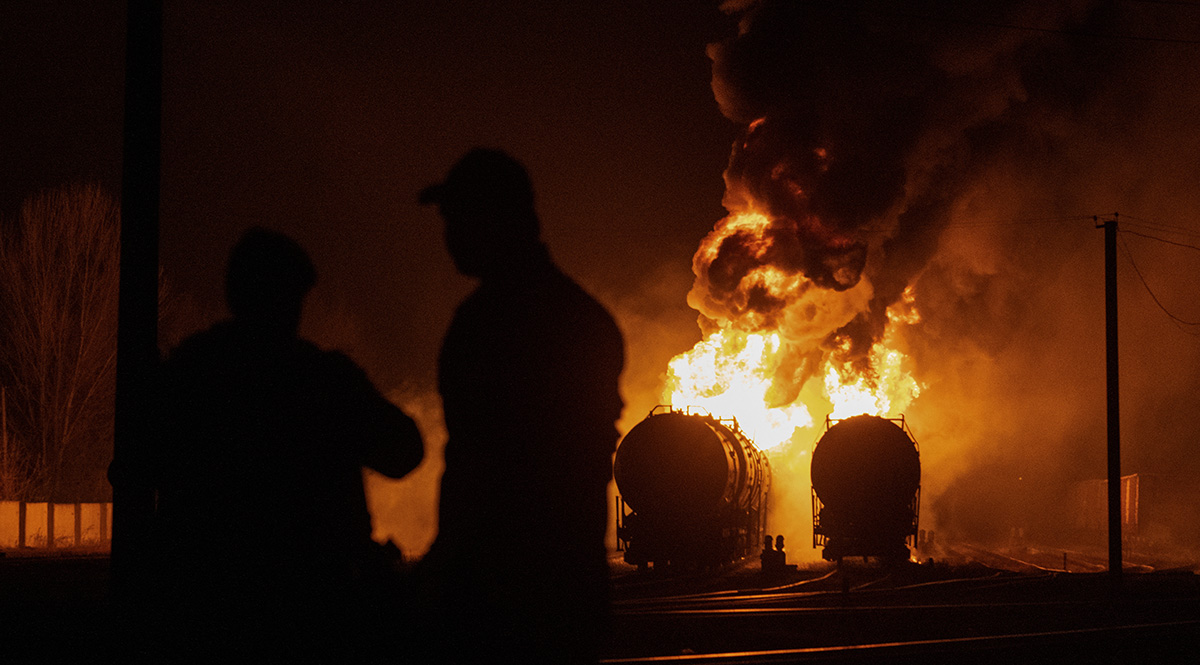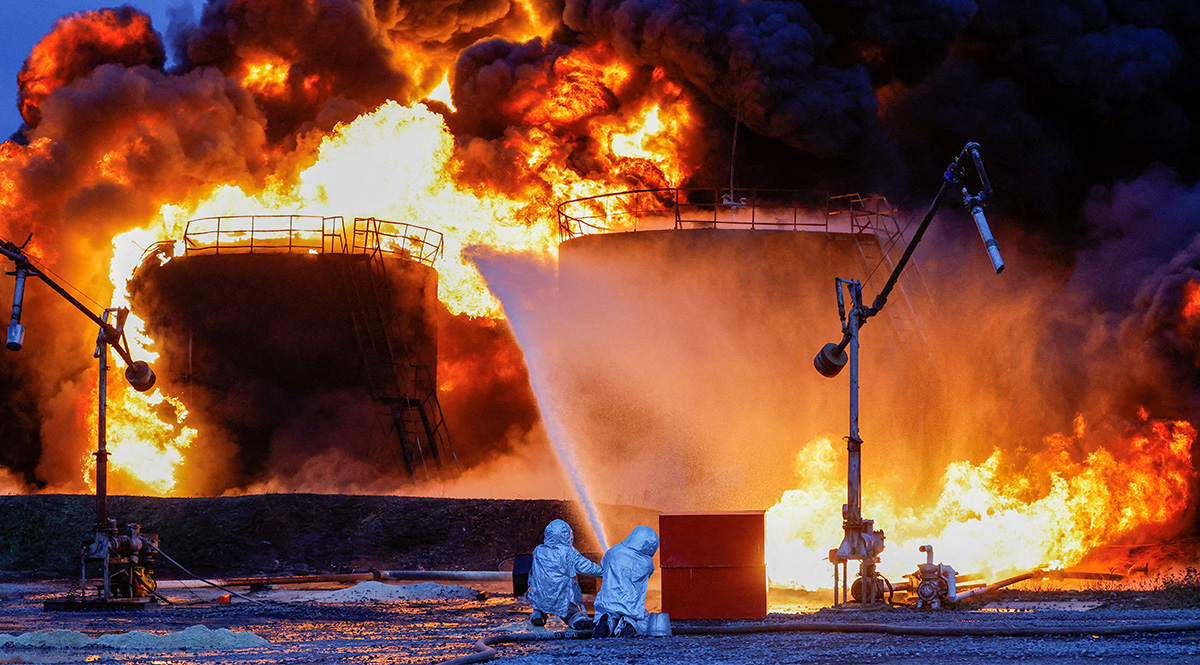Russia's Fuel Sector Faces Increasing Instability
Russia’s fuel market is experiencing an accumulation of problems caused by Ukrainian attacks on the country’s oil infrastructure, floods, logistical difficulties, and the impact of technological sanctions. Aware of the scale of the challenges, the Russian government is taking various countermeasures, including an embargo on petrol exports and a lowering of refining quality. Russia’s problems could lead to lower oil prices on global markets, worsen Russia’s economic situation and make it more difficult for it to wage war against Ukraine.
 STRINGER / Reuters / Forum
STRINGER / Reuters / Forum
Russia’s fuel processing base consists of 32 large and 80 smaller refineries. Most are owned by state companies—Rosneft, Lukoil, and Gazprom. In 2023, more than half of the fuels produced went to the domestic market. Exports accounted for about 15% of government revenues and about 10% of global seaborne trade in refined products.
Causes of the Fuel-Sector Problems in Russia
The strategic importance of the sector for economic, social, and military reasons, along with weak air defences, have made oil infrastructure the main target of Ukrainian attacks on Russian territory. They intensified in March 2024, with more than 20 refineries, including the largest in Kstovo, Samara, Ryazan, Tuapse, and Volgograd, numerous fuel and oil storage facilities, and the terminal in Ust-Luga hit. According to Western media and Pentagon assessments, these and other incidents have caused a drop in oil processing in Russia of at least 14%. The location and timing of the attacks, as well as comments by the Ukrainian services, suggest a deliberate attempt to destabilise the Russian fuel market in order to make it more difficult for Russia to wage war.
The instability of the Russian market was exacerbated by the floods in southern Siberia in April, which further hampered fuel transportation and halted operations at the Orsk refinery, among others. Labour shortages are also significant due to increasing competition (e.g., in wages) for workers from the defence industry and the military. In addition, the functioning of the Russian oil sector is affected by Western technology sanctions imposed on it, resulting in difficulties in carrying out maintenance or repair work, and lowering the level of cybersecurity, for example, due to the inability to update software.
Russian Authorities’ Response
Russian elites are aware of the threat of the fuel crisis and its importance for the stability of the state. Vladimir Putin is personally involved in measures to mitigate the crisis. To maintain high fuel supplies, the authorities have temporarily banned seasonal servicing of refineries. They have imposed a reduction in refining quality (from the Euro-5 standard to the Euro-3 standard, no longer used in Europe), which is expected to increase production by up to 10%.
At the beginning of March, the authorities introduced a six-month embargo on petrol exports, the scope of which may be changed in the near future. In the same month, Russia began importing petrol from Belarus, which is expected to cover up to about 4% of Russia’s fuel needs. The Russian authorities have offered to expand oil supplies to Belarus in exchange for increased petrol production at local refineries. In early April, according to media reports, Putin held talks with Kazakh President Kassym-Jomart Tokayev to secure a third of Kazakhstan’s petrol reserves in case of a fuel crisis in Russia. Tokayev dismissed these agreements. Given Kazakhstan’s limited petrol production capacity due to ongoing repairs and logistical difficulties in transporting fuel, the short-term potential for Kazakhstan to make up for Russian shortages is low. According to media reports, Russia has significantly increased imports of parts and components from China in order to minimise the impact of technological sanctions.
Russia’s response to the loss of revenue from the sale of refined oil products has been an increase in exports of crude oil. In doing so, it is rejecting the possibility of export cuts as part of its cooperation within the OPEC+ cartel. It is also increasingly using a “shadow fleet” of tankers and other mechanisms to circumvent the oil price cap imposed by Western states.
At the same time, due to ineffective air defences, the Ministry of Defence is having to contribute to the cost of refineries’ protection by helping them build their own anti-drone defences. These often take the form of primitive barriers or GPS signal jamming, without significantly improving the security of the infrastructure.
In retaliation for attacks on its oil infrastructure, Russia has since late March carried out a series of heavy strikes against Ukraine’s energy sector, in particular heat and power stations, conventional power plants, hydroelectric power plants, and gas storage facilities. According to Putin, the Ukrainian attacks required a response, and their severity is intended to undermine Ukraine’s military capabilities, reduce its willingness to pursue its strategy, and weaken the Ukrainian economy and the morale of its civilian population. In the information sphere, Russia is promoting the false narrative that the Ukrainian attacks are contributing to a rise in global oil prices.
Social and Economic Consequences of Instability
Reduced production, the cost of repairing damaged facilities, and a decline in the economic efficiency of refining processes, with a reduction in high-margin exports of refined products, affect the revenues of oil companies. Their financial situation is exacerbated by the government’s restrictive fiscal policy, including passing on the cost of fuel subsidies. The overlapping problems with the need for air defences for the refineries increases the dependence of the sector on the authorities. Its poor financial condition and the decline in exports of refined products in turn have a negative impact on revenues to the state budget, which means an increase in Russia’s war costs.
The decline in the quality of Russian fuels also affects the environment and can lead to damage and accelerated degradation of modern combustion engines. In the medium term, it may also reduce the competitiveness of these fuels on global markets, while Russia withholding exports and the risk of further supply disruptions reduce the willingness of third countries to contract for imports of Russian petroleum products.
Despite limited processing, fuel prices at Russian gas stations are not rising. This is because of subsidies by the authorities, aware that Russian society is sensitive to price increases that could increase inflation pressures and lead to social discontent. At the same time, the lack of demand-side incentives could contribute to lower fuel stocks and fuel availability problems. According to available data, the biggest supply challenges could arise in southern and central Russia.
Rough estimates suggest that the fuel requirements of the Russian army fighting on the Ukrainian front could be 3-5% of national consumption. Therefore, strikes on fuel bases near the front line and refineries in the central part of Russia, as well as nationwide logistical problems in rail transport, could hamper the army’s fuel supply.
Prospects
Problems in Russia’s fuel sector are expected to peak during the summer season. It will depend on the timing of repairs to damaged refineries, failures caused by lack of maintenance, and the intensity of Ukrainian strikes. The organisation of storage and transport logistics, particularly by rail, will be of great importance.
The authorities will seek to increase the supply of fuel on the domestic market, maintain prices, and ensure continuity of supply to the army. In addition, the representatives of the sector will seek to resume profitable exports as soon as possible and maintain their continuity. In terms of communication policy, the authorities and the sector will try to hide the problems by presenting a message that they are in control of the situation and see prospects for rapid stabilisation, including on export markets. Russia’s processing problems may also trigger fuel price increases in related markets (e.g., Belarus).
It remains in the interest of Western countries to enforce sanctions effectively, including further lowering of the price cap and keeping technology restrictions in place. This could lead to a lower oil price and hit the Russian budget. It is advisable to support Ukraine in continuing its adopted tactics of attacking Russia’s oil infrastructure and to increase the supply of weapons, especially long-range weapons (with permission to use them against targets in Russia) and air defence systems to counter retaliatory attacks.


.png)


